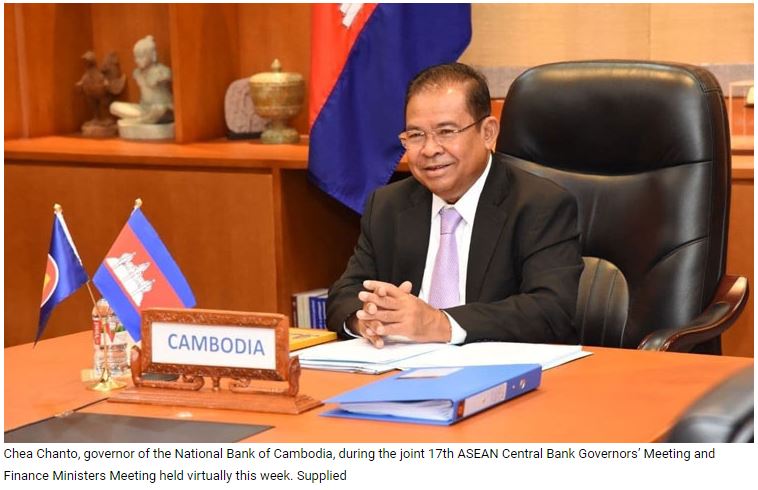ASEAN central bank governors, finance ministers ponder economy
ASEAN’s central bank governors and finance ministers agreed that in order to restore their economies in the post COVID-19 period they must strengthen their digital infrastructure and data connectivity.
The representatives of the 10 Southeast Asian countries say they will invest more in human resources and infrastructure to strengthen economic productivity and support and promote the development of small and medium enterprises in order to create more jobs.
They also aim to strengthen public spending and social protection programmes in order to alleviate the plight of vulnerable people, to promote the use of local currencies for regional exchanges and to further expand regional cooperation and integration.
These commitments were made at the joint 17th ASEAN Central Bank Governors’ Meeting and Finance Ministers Meeting held virtually this week. Brunei chaired the event.
Chea Chanto, the governor of the National Bank of Cambodia, who attended the meeting, said the objective was to discuss the regional and global economic situation, the various economic recovery policies and the progress and direction of strengthening ASEAN financial integration.
Because of the outbreak of COVID-19, ASEAN economic growth in 2020 was negative, with its economy contracting by 4.4 percent. It is expected to grow by 5.2 percent in 2021, Chanto said.
He added that ASEAN financial integration aims to open up regional capital flows, provide financial services, develop secure regional financial markets, improve the financial environment and connect regional payment systems to support community development and the ASEAN economy.
Chanto said ASEAN members achieved 19 out of 28 planned projects in 2020, with Cambodia scoring highly in opening up capital flows and financial services after Singapore, without specifying how high.
“As for financial inclusion, Cambodia has also promoted the use of financial services, especially for women, who now form 71 percent of the adult population with access to formal financial services in line with the ASEAN target of 70 percent by 2020,” he added.
However, Chanto said Cambodia has a lower level of human resource development than some ASEAN countries and, to reduce this gap, Cambodia, as well as Vietnam, Laos, Myanmar and Brunei, have received training and shared experiences from more developed member countries.
In order to further promote financial integration, the financial environment and financial stability in line with the ASEAN Economic Community Strategic Plan 2025, the meeting approved three main tasks. These are creating a policy document on management measures of capital flows, the preparation of protocols for financial services, which will further liberalise some sectors and sub-sectors, especially in the insurance sector and the establishment of a tax board, which will have the role of developing principles in the financial sector sustainably and environmentally. In 2022, Cambodia will chair ASEAN and the National Bank of Cambodia will be hosting the 18th ASEAN Central Bank Governors’ and Finance Ministers’ Meeting.
Source: https://www.khmertimeskh.com/50833262/asean-central-bank-governors-finance-ministers-ponder-economy/


 Thailand
Thailand




